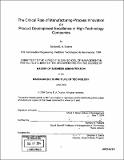The critical role of manufacturing-process innovation on product development excellence in high-technology companies
Author(s)
Duarte, Carlos E. A., 1962-
DownloadFull printable version (4.317Mb)
Other Contributors
Sloan School of Management.
Advisor
Edward B. Roberts.
Terms of use
Metadata
Show full item recordAbstract
Few managers of high-technology companies view manufacturing-process development as primary source of competitive advantage. For the last two decades trends have shown an increasing number of high-tech industries outsourcing manufacturing completely to third-party contractors or joint-venture partners. In doing so, companies have tried to avoid the risks of investing in expensive manufacturing plants and losing focus on product research and development (perceived as their true source of advantage). Research on the pharmaceutical industry, over the period between 1985 and 1995, suggests that such thinking is often costly and potentially dangerous to the competitive health of high-tech companies. Studies highlighted a pattern where companies that built organizational capabilities to support innovative, fast, efficient and effective process development, could introduce new products more quickly, with higher yields and controlled processes that gave them a significant cost advantage over competitors. And, surprisingly, they often required less capital investment and fewer development resources than their more conventional competitors. The discovery of this pattern in pharmaceuticals, an industry in which product innovation is paramount, stimulates us to look at other high-technology industries for similar patterns. This thesis explores a framework to understand how manufacturing-process innovation can be a hidden advantage to high-tech companies competing on the basis of product innovation. It also provides examples of companies, in a variety of high-tech industries, which exhibit a pattern similar to the one found in the pharmaceuticals and have accrued tremendous advantages by treating process development as an integral (cont.) part of the product development cycle.
Description
Thesis (M.B.A.)--Massachusetts Institute of Technology, Sloan School of Management, 2004. Includes bibliographical references (leaves 90-95).
Date issued
2004Department
Sloan School of ManagementPublisher
Massachusetts Institute of Technology
Keywords
Sloan School of Management.